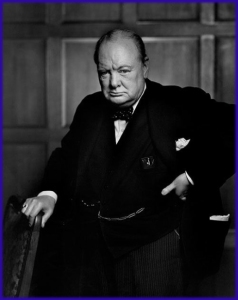Today marks fifty years since the death of Winston Churchill, a man many historians regard as the greatest person of the twentieth century.
Great doesn’t mean perfect of course. Like many of us, Churchill had his good moments and his misguided ones. He remains a controversial figure, especially among the many people who know nothing about the man. In any case, I believe we can learn a great deal about leadership by studying Churchill, and that these lessons have particular value in the Lean organization.
I first read Churchill’s Nobel-prize winning six-volume history, The Second World War, after finishing college, in part, I suppose, because I found it odd to have nothing I was required to read. I was hooked from the start. The guy was a helluva writer.
Since then I have read almost all of Churchill’s major works, and a good many books about the man. Along the way I have made mental notes about his work habits. I thought that, to mark the fiftieth year since his death, it would be worthwhile to write down some of what I have learned.
(I should note that I’m normally skeptical of using war or sports analogies in business. However, war does provide a level of stress that brings to light problems in systems and personalities that could easily remain hidden in normal times, so learning from war and war leaders, done cautiously, serves a useful purpose.)
Click on the subject that interests you.
Listen.
Ask questions.
Give clear directions.
Don’t get angry at challenges to your ideas. Learn from them.
In most cases, it isn’t the person, it’s the process.
Learn to think in terms of a system.
Go and see for yourself.
Have courage. Tell the truth, and expect others to do the same.
Great oratory is built on great arguments. Master your facts and your arguments first.
Measure a lot of things, and have something to compare them to.
Copyright 2015 by Paul G. Spring. All rights reserved.

